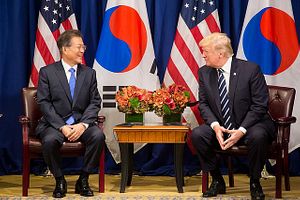Pity poor President Moon Jae-in of South Korea. After being swept into office this spring on a reformist wave following his predecessor’s corruption scandal, he is finding out that he’s damned if he does and damned if he doesn’t – at least when it comes to South Korea’s relations with the United States. Even after drifting toward President Donald Trump’s more hardline approach to the menacing actions of North Korea’s Kim Jong-un, Moon finds himself on the defensive with Trump’s “America First” approach to trade. South Korea deserves better from the United States.
Ever since Moon’s special election victory in May, Kim Jong -un has been forcing the world to confront the terrifying prospect of the use of nuclear weapons. The Trump administration’s role in bringing Seoul around to their position of “all options on the table” should not be understated. Despite condemnations of Trump’s criticisms of Seoul’s dovish stances, it is safe to say at this point that Trump has gotten the last word. Although he campaigned on a dovish platform, Moon’s approach to the North has been decidedly more hawkish than anticipated, as a result of arm-twisting by the White House. He has gone from wanting to talk more to Pyongyang to setting up a decapitation squad to take out the North Korean supreme leader at a moment’s notice – all within the span of a few months. After campaigning in opposition to a missile defense system the United States championed, Moon soon realized he had no option but to acquiesce. His country’s stalwart alliance with the United States now compels Moon to play in a dangerous global chess match.
Moon might have expected that such loyalty and common purpose with the United States would be accompanied by reciprocal treatment by its indispensable ally. Yet, despite relenting on all major U.S. demands, Moon is still being dragged through the dirt – especially on the economic front. Trump has called the U.S.-Korea free trade agreement (KORUS) a “horrible deal” for the United States and threatened to pull out of the pact. When the agreement was being negotiated, there were deep and spirited divisions in the country, all of which could break open again if the trade deal was tossed back on the negotiating table. In essence, the screws have been put on Seoul: Pax Americana by way of an “America First” trade policy – a “transactional” approach, some might call it. But a transaction implies a quid pro quo; although South Korea has given in to the White House, the screws remain in place.
A concrete example of recent economic discrimination involves leading South Korean companies LG and Samsung, which have been dragged into a trade dispute by U.S. appliance maker Whirlpool. Whirlpool has attempted to leverage the Trump administration’s America First philosophy to freeze out its competitors through trade remedies at the U.S. International Trade Commission (USITC). Whirlpool alleges its two main competitors are underpricing washing machines in the U.S. market; the USITC, in its initial assessment of the facts, agrees. On October 5, the USITC announced it has “determined that large residential washers are being imported into the United States in such increased quantities as to be a substantial cause of serious injury to the domestic industry.”
Once again, it seems America First trade policy is heavier on stick than on carrot. The fact that Samsung recently invested $380 million to open a manufacturing plant in South Carolina – expected to generate almost 1,000 jobs – doesn’t seem to be doing them any more favors than Seoul’s newfound hawkishness toward the Kim regime above the 38th parallel.
One would think America First would mean finding common ground with companies pouring money and jobs into the United States. And one would hope President Trump believes it is not the federal government’s job to pick winners and losers in the washing-machine market and pad Whirlpool’s profits through government handouts at the USITC.
The USITC is expected to announce remedy recommendations on December 4, followed by a final decision by Trump anticipated by early 2018. If Trump is truly committed to creating well-paying jobs, growing investment, and encouraging innovation here in the United States, he will resist placing barriers on these growth opportunities. Given the large inflows of manufacturing investment from South Korea and the current geopolitical landscape surrounding our close ally, the Trump administration has more than ample cause to reject shutting South Korea’s products out of the U.S. market.
Moon must grapple with circumstances he had not counted on when he took office. He has exhibited admirable pragmatism and bolstered Trump’s approach to North Korea, an approach some foreign-policy thinkers believe is risky. It is now Trump’s turn to show comparable pragmatism in the service of maintaining a strong economic and strategic partnership with South Korea.
Felipe J. Cuello is a Republican consultant who worked on the Trump campaign and a former member of the Presidential Transition team’s Defense and Foreign Policy coordination unit. He currently advises various European officials on foreign policy.

































